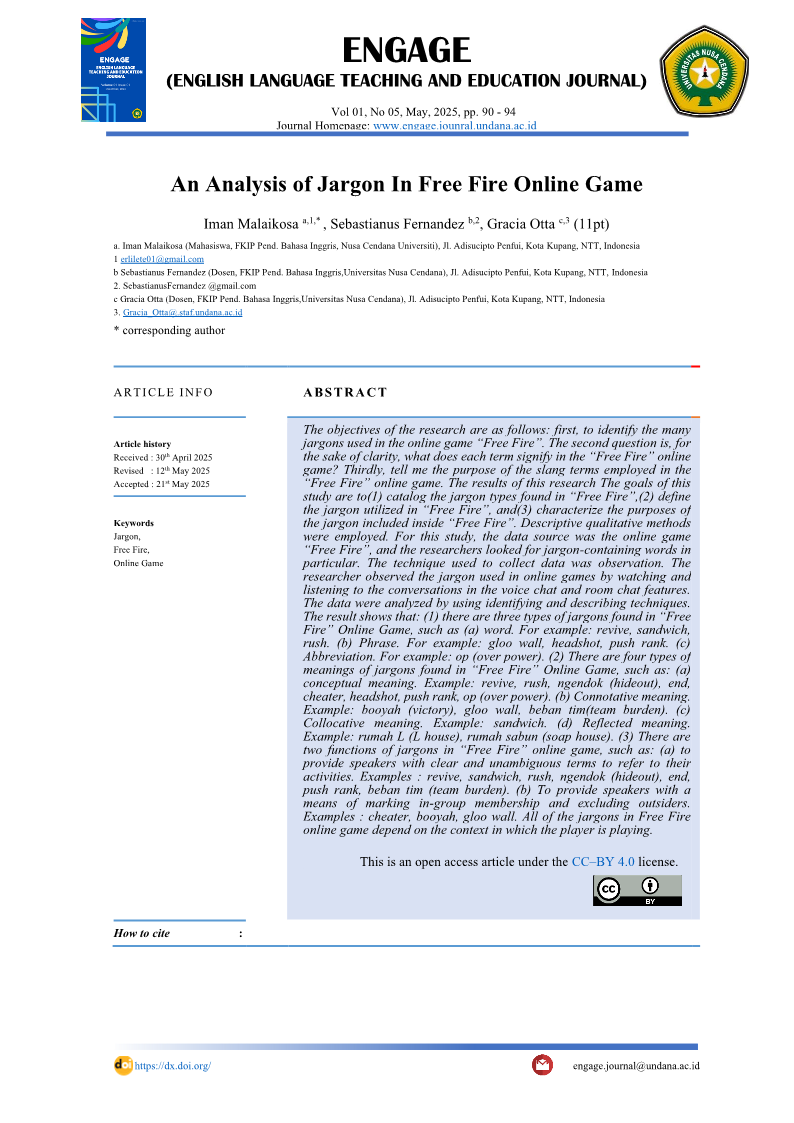An Analysis of Jargon In Free Fire Online Game
Keywords:
jargon, free fire, online gameAbstract
The objectives of the research are as follows: first, to identify the many jargons used in the online game “Free Fire”. The second question is, for the sake of clarity, what does each term signify in the “Free Fire” online game? Thirdly, tell me the purpose of the slang terms employed in the “Free Fire” online game. The results of this research The goals of this study are to(1) catalog the jargon types found in “Free Fire”,(2) define the jargon utilized in “Free Fire”, and(3) characterize the purposes of the jargon included inside “Free Fire”. Descriptive qualitative methods were employed. For this study, the data source was the online game “Free Fire”, and the researchers looked for jargon-containing words in particular. The technique used to collect data was observation. The researcher observed the jargon used in online games by watching and listening to the conversations in the voice chat and room chat features. The data were analyzed by using identifying and describing techniques. The result shows that: (1) there are three types of jargons found in “Free Fire” Online Game, such as (a) word. For example: revive, sandwich, rush. (b) Phrase. For example: gloo wall, headshot, push rank. (c) Abbreviation. For example: op (over power). (2) There are four types of meanings of jargons found in “Free Fire” Online Game, such as: (a) conceptual meaning. Example: revive, rush, ngendok (hideout), end, cheater, headshot, push rank, op (over power). (b) Connotative meaning. Example: booyah (victory), gloo wall, beban tim(team burden). (c) Collocative meaning. Example: sandwich. (d) Reflected meaning. Example: rumah L (L house), rumah sabun (soap house). (3) There are two functions of jargons in “Free Fire” online game, such as: (a) to provide speakers with clear and unambiguous terms to refer to their activities. Examples : revive, sandwich, rush, ngendok (hideout), end, push rank, beban tim (team burden). (b) To provide speakers with a means of marking in-group membership and excluding outsiders. Examples : cheater, booyah, gloo wall. All of the jargons in Free Fire online game depend on the context in which the player is playing.
Downloads

Downloads
Published
Issue
Section
License
Copyright (c) 2025 ENGLISH LANGUAGE TEACHING AND EDUCATION JOURNAL

This work is licensed under a Creative Commons Attribution-NonCommercial-ShareAlike 4.0 International License.






